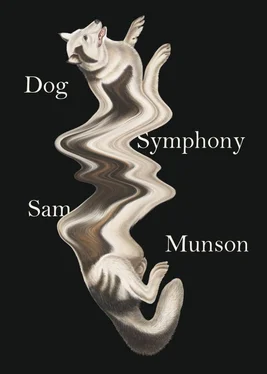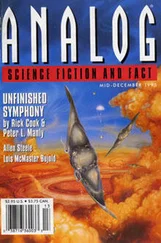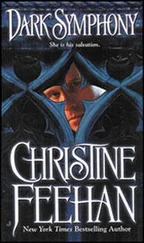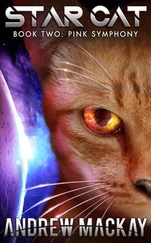I decided that if I was caught by a night watchman I would tell him I was a “writer.” (NB: the generalized “writer” does not exist; all real talent clings to specific forms.) I would explain to this theoretical watchman that spending a night in La Chacarita was essential to my “writing.” I found a pen in my jacket pocket: that’s proof. Also a folded paper scrap in my wallet, on which I wrote down the words oak upright , night , canine might , hubcap manufacturer’s delight . The fetus of a poem: more proof. The dogs now trotted with increased, almost desperate speed down Newbery as I jogged up it, and even the ones urinating or defecating did so in a human hurry. I’d never seen anything like it before. Dogs always take their time shitting and pissing and here they were, shitting and pissing on the run, their quiet howls less frequent. Fewer galloped past now, unhappy stragglers heading for the gap in the cemetery wall. The moon was down. The first livid tints of the sunrise stained the sky. The long streets that led to the ocean began to reveal themselves.
No police or cemetery watchmen in the entrance plaza, only two periwinkle nylon tents fronted by crude wooden counters, facing each other with martial indifference. The last dogs ran past, real blurs, yowling and barking, ragged echoes multiplying, and I lay full-length on a cool, whitish bench. I closed my eyes. I listened to the rapid rustling of the nylon and the rarer and rarer shouts from the dogs as the air warmed around me. In short, I passed out at the foot of my goal. And that’s how I knew I was still human.
THE MURMURS OF TWO flower vendors mingled in the stagnant heat. The vendors occupied the two tents. They shared one skinny lackey, a teenaged boy with no shirt, who darted back and forth between the tents spraying water on the flowers from a plastic bottle, adjusting their blossoms, repositioning their stems in their green buckets, and muttering to his two masters.
Southern sunlight coated the white marble entrance plaza, the flagstones, and the benches. Like incipient blindness. When I staggered into the shade of the blue-lipped tent roof, I found relief, though the pollen-thickened air was hard to breathe. The lilies and freesia crammed into the buckets emitted their suffocating and meretricious (in the literal sense) smell. Green, raw-looking shelves above and behind the green buckets held a small variety of other goods: cigarettes, gum, plastic combs, antacid tablets, bottled water, fringed leather key-ring fobs to which gold-leaf labels reading (in English) GENUINE PAMPAS HARE had been affixed. I bought a bottle of water so I would have an excuse to speak to the vendor, ask him what time it was and if he had any matches. I had not put my wristwatch on before my walk and had exhausted the matchbook the sad clerk had given me. I thought you were going to ask me for a beer, said the vendor, you look like a derelict. Pollen speckled his iron-colored hair. We don’t sell any, he went on, but maybe we should. I said that I never knew anyone to lose money selling beer. The vendor told me my Spanish was good, so good he didn’t believe I was a tourist. And I know you’re not from Uruguay, you’re too tall, he said. I didn’t see any other customers, and the vendor must have noticed me noticing, because he spoke up: We don’t get a lot of customers at this time of day, but we stay open anyway. His counterpart cried out that they had to, you never knew what was going to happen, what if someone showed up to visit a relative and we weren’t here to sell them flowers?
They were brothers, it turned out. The Taquini brothers. They had operated the stands for eleven years, said Fulvio (the elder, who sold me the water), eleven good years. The water worsened my headache but cooled my throat, so I kept drinking and drinking, while glancing around to see if the dogs were present, asleep in the humble (even humiliating) shadows dogs like. I saw none. I asked Fulvio where they’d gone. He looked off into the stony glare beyond the tent, and I repeated my question. What dogs, said Fulvio.
I began to stammer, to wonder if I had dreamed up the quiet, orderly animals that filled the southern night. But Fulvio’s brother shouted: Stop fucking with him. Fulvio grinned, tight and dull — except for his golden incisor. The dogs, where do I start, he sighed. Fuckers, shouted Adriano, you have to say they’re fuckers before you can say anything else, otherwise you won’t convey the truth. Fulvio, peeping through his thick fingers, told me that their arrival had hurt the business. The lull he had blamed on the hour was merely one more vacuity in their empty days, their empty months; Adriano added that at first the dogs hadn’t done them any harm, that people still came to visit their dead parents and siblings, they still bought flowers, and still tended the grass on their graves, but that after two weeks or maybe three, the pedestrian traffic slowed and the only visitors who still showed up came from outside the city, where the dogs had not yet spread. You don’t know that, said Fulvio, my friend in Coronel Pringles said there’d been sightings of at least a few dogs at night there, and people have started putting out meat and water. Worse, said Fulvio, his friend had even seen a shrine go up. That’s when we knew we were in trouble, said Adriano, when we saw the first shrine. I told you — right, Fulvio? It was about two months ago, and business really fell off after that. I asked them why the dogs had done so much damage, if the locals thought the cemetery was unsafe because of them. Adriano said, amid a bitter laugh: Maybe you really are from Uruguay.
I explained that I was not Uruguayan, that I had come for an academic conference, that this was my first time in the city. So you’re a professor, said Adriano. The academy, said Fulvio, that’s what we should have done, there you don’t have to worry about epidemics, your living is safe. Just look at the Department of Social Praxis. I’d never heard of this department before. It’s in the University, said Fulvio, there isn’t anything like it anywhere, or at least that’s what the ads said. Adriano wanted to know what I specialized in. I explained, and he asked if I’d seen the prison in Patricios, the Cárcel de Caseros. It’s just a wall now, he said, they blew up the main buildings, and some artist did some stupid thing there. Foreign artists always come here and bring their stupid ideas about art, said Adriano. And then there’s Devoto, but that’s boring, everyone knows about that, or maybe you don’t? I did know both prisons, I said, but nothing is more important than local knowledge in observing prisons and the spiritual structures that surround them. You see, said Adriano, there’s a man who knows his limitations. Academic types can be very high-handed here. The lackey was about to speak, but Adriano silenced him. Keep your mouth shut, he said, the professor doesn’t want to hear your theories.
I told Adriano that I was always interested in theories, whoever might propose them. He sighed and shook his head. They are of no consequence, Professor, Adriano said, they’ll just muddy the waters — you saw it all last night, so you understand, don’t you? I told him I did not understand him. The lackey went back to spraying the lilies and freesias, his spade-like shoulder blades working under his thin-looking skin. I know you just arrived, said Fulvio, but you really don’t know? He took me by the arm (the avuncularity of this impeccable world) and escorted me back into the sunlight. Beyond the iron gate, now open, the green lawns rose and fell. Fulvio pointed out over them and said: You see any dogs there? He was right. No dogs, not one. I asked again where they went. He shook his head. If we knew that, he said, do you think we’d be suffering the way we are? They come out at night, they eat the meat, they drink the water, they come back, and then poof, nothing. A mower hummed. Strong and reverential. I wanted to tell Fulvio he had to be mistaken, but given the total absence of dogs — and I had seen hundreds, perhaps even thousands, fighting their way through that gap in the wall on Warnes — I couldn’t. I suggested, instead, that he hire masons to brick up the hole, or fill it with rocks or wood himself, and he laughed in the same bitter, avian way his brother had. We tried that, he said, we tried that eight or nine times, maybe ten, and every time it was the same. The dogs came out after sundown anyway and when we ran to check the hole, our barricade was gone as if it had never been there in the first place. He blew on his fingertips. A small cloud of pollen leaped off them. Adriano said: It was like a magician came in and waved his wand.
Читать дальше












